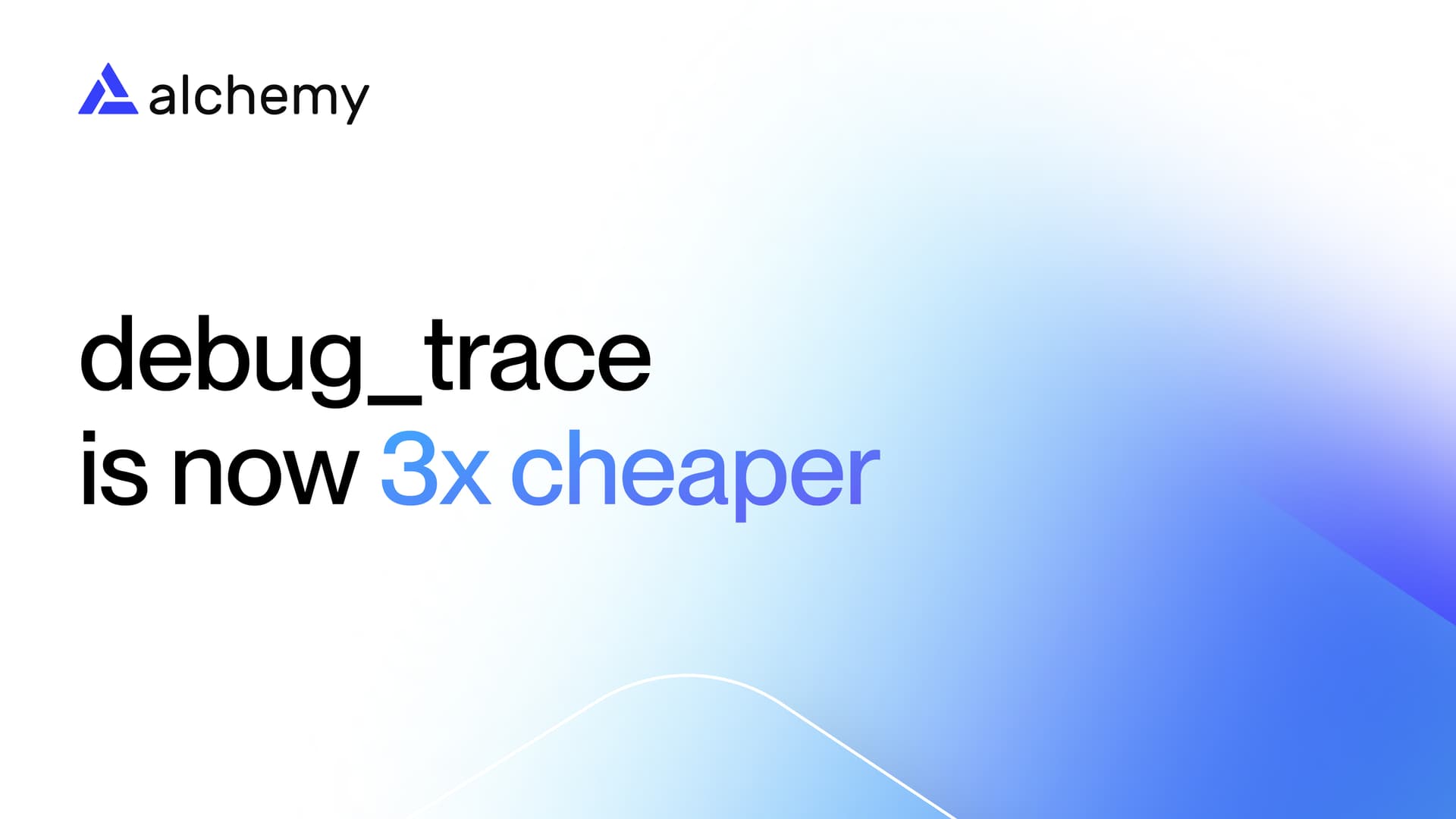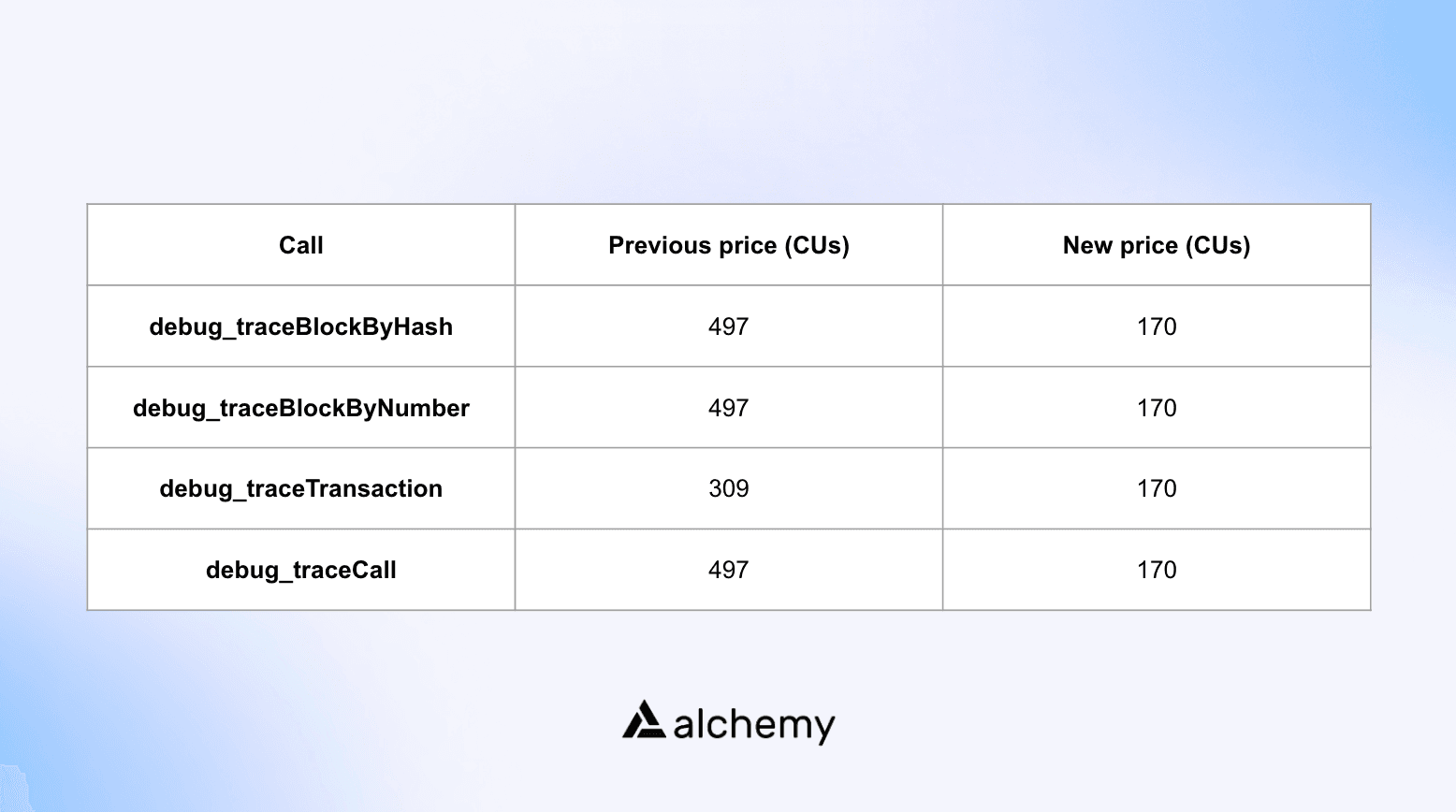Deeper application insights at lower costs
Authors: Suzanne Slaughter, Bharath Sitaraman

Build what you want, how you want, accessing the most value at fair, transparent prices.
That’s why, after listening to your feedback, we’ve reduced the Compute Unit (CU) cost of four critical debug_trace methods, giving you a more cost-effective solution for gathering comprehensive transaction execution details.
debug_trace methods are important for debugging, troubleshooting, and understanding why a contract behaved in a certain way.
By re-architecting back end infrastructure, Alchemy has been able to pass up to 3x efficiency savings to you for four key debug_trace methods:
debug_traceBlockByHashdebug_traceBlockByNumberdebug_traceTransactiondebug_traceCall

In practice, the reduction in CUs means you can access massive value and important insights at significantly reduced cost.
Ready? Get started with debug_trace methods today.
Remind me, what’s a Compute Unit (CU)?
Compute Units (CUs) measure total computational resources apps use when making requests on Alchemy, taking into account the fact that some queries are lightweight and fast to run (e.g., eth_blockNumber) while others are more intense (e.g., eth_getLogs).
To that end, each method is assigned a quantity of CUs. You are charged based on the resources your application actually uses, rather than a flat fee per request. In this sense, CUs work like gas on mainnet, where the fee is correlated with a transaction’s execution.
More to come on how to think about CUs within the broader marketplace.
Digging into debug_trace
The substantial decrease in CUs for debug_trace makes all of these calls considerably more affordable to use, enabling you to explore transaction execution at a granular level.
Why does this level of detail matter?
It’s simple: The downside of contract execution is that it is very hard to tell what a transaction actually did.
Existing methods to get transaction receipts, like eth_getTransactionReceipt, while useful, lack granularity at the transaction execution level.
When you’re trying to iron out a bug, this means that while some information can be gleaned, much more data is missing.
By contrast, debug_trace methods capture a breakdown of what happens during a transaction's execution, a critical unlock for builders. These methods capture the intricate details of smart contract interactions, such as:
The sequence of calls made between contracts
The data passed and modified during those calls
The gas usage at each step
The success or failure status of individual actions
At this level of granularity, you can troubleshoot, look for efficiencies, and better understand your app.
Who will benefit from this cost reduction?
You! 😁
More affordable debug_trace methods are super important across all Web3 verticals:
Wallet builders: Get deeper insights into transaction processing and user interactions within your wallet.
Analytics platforms: Detailed transaction data for more accurate and valuable insights into users.
Marketplaces: Get a better sense of transaction flow to enhance security, help you track activity, and lead to optimized platform operations.
Any app developer: Whatever you’re building,
debug_tracemethods provide the best insights to build a killer, unbuggy app.
So what are you waiting for?
Thousands of developers and teams are already building with Alchemy. In fact, if you’ve used any web3 app, you’ve probably used Alchemy.
What to learn more? Dive into the docs today.
Alchemy Newsletter
Be the first to know about releases
Sign up for our newsletter
Get the latest product updates and resources from Alchemy
By entering your email address, you agree to receive our marketing communications and product updates. You acknowledge that Alchemy processes the information we receive in accordance with our Privacy Notice. You can unsubscribe anytime.
Related articles

Introducing Prices API
Save development time with our new API for real-time and historical token prices.

New Integrations for Rollups partner: Parsec
Say goodbye to confusing block explorers. Parsec brings context and visual transaction flows to your rolllups.

Polygon Mumbai Support Ending April 13th - Migrate to Amoy
Polygon will deprecate the Mumbai testnet on April 13th, 2024. We encourage developers to migrate to Polygon Amoy immediately.